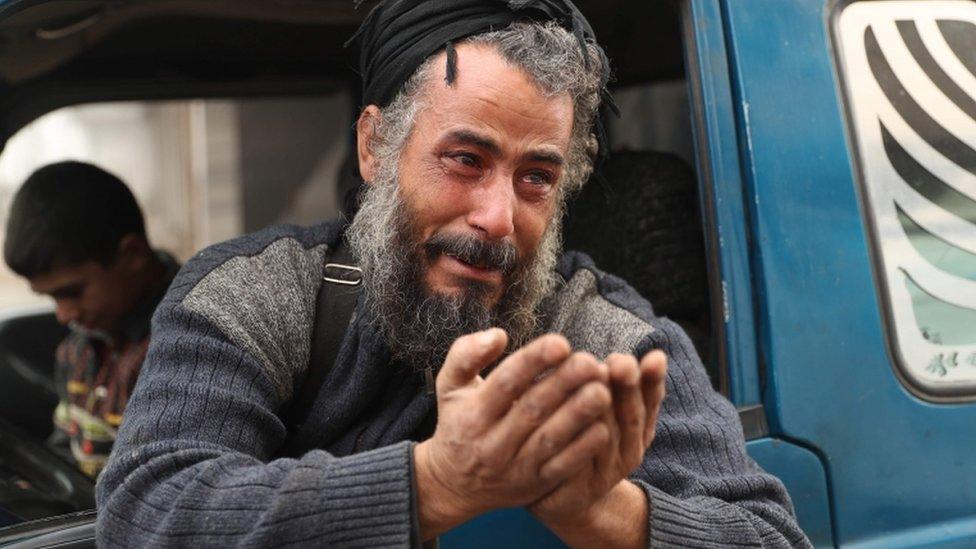Syria war: More than 235,000 people flee rebel-held Idlib region
- Published

A man was pictured sobbing as he left Maarat al-Numan
More than 235,000 people have fled from their homes in Syria's rebel-held Idlib province, the UN says, as government forces step up their offensive on the area.
The exodus happened between 12 and 25 December as fighting intensified.
Idlib in north-western Syria is the last major region held by rebels opposed to President Bashar al-Assad.
The Russian-backed Syrian government has been bombarding Idlib since late November.
An increase in air strikes and ground fighting since mid-December has accelerated civilian displacement from the area, .
Tens of thousands of families - including some already displaced numerous times during the civil war - have been heading north in trucks and private cars.
The government offensive had left the city of Maarat al-Numan and the nearby region in southern Idlib "almost empty", Ocha said.
Most of the displaced civilians are moving to cities and refugee camps in northern areas of Idlib and neighbouring Aleppo province.
Displaced civilians are said to be in urgent need of humanitarian aid
A man loads a truck as government forces bear down on Maarat Al-Numan
"Many who fled are in urgent need of humanitarian support, particularly shelter, food, health, non-food and winterisation assistance," the UN said.
But the exodus has also been hampered by fuel shortages and the fact that some drivers don't want to risk being bombed as they drive.
Thousands more families were "frightened to move, fearing the risk of air strikes and shelling along the routes", the UN said.
Most displaced civilians are said to be moving north to cities and refugee camps
Some families have already been displaced numerous times during the civil war
A ceasefire negotiated by Russia, whose military campaign in support of Mr Assad has turned the tide of the eight-year civil war in his favour, and Turkey, which backs the opposition, halted a government assault on Idlib in August.
But the fighting has continued sporadically as President Assad attempts to wrest back control of Syria from rebel fighters and jihadists.
Families in Syria use any transport they can to flee violence in Idlib
In September, the UN Office for the High Commissioner for Human Rights (OHCHR) said it had as a result of hostilities between pro-government and opposition forces.
On Thursday US President Donald Trump urged Russia, Syria and Iran to stop the violence in Idlib.
Allow Twitter content?
This article contains content provided by Twitter. We ask for your permission before anything is loaded, as they may be using cookies and other technologies. You may want to read and before accepting. To view this content choose āaccept and continueā.
.
- Published18 December 2019
- Published23 December 2019
- Published3 November 2019